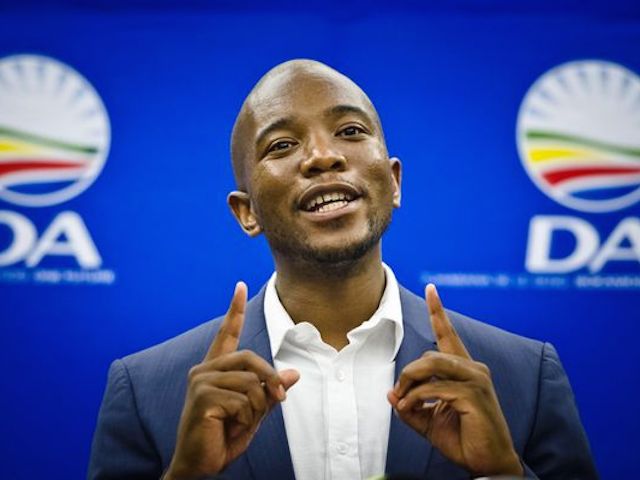
Democratic Alliance leader Mmusi Maimane. The DA is the only major opposition party in South Africa.
Since the dawn of the liberal, multicultural democracy in South Africa in 1994, politics have been solidly controlled by the left, in line with the intention of the system’s architects. Naturally, a political spectrum and Overton window shift has occurred in the country over the past twenty-two years, with a gradual yet decisive shift leftward marking the political discourse and, consequently, political party policies. The mainstream media and academia have increasingly advocated what is often termed “nonracial democratic values,” as purportedly advocated by Nelson Mandela, a man regarded by liberal and Marxist-leaning South Africans as “the father of the nation.”
Since 1994, however, the country has politically been solidly in the hands of Mandela’s party, the African National Congress, which has always explicitly promoted what it considered to be black interests, and has consequently achieved the most electoral success. In all local and national elections between 1994 and 2014, the ANC consistently received between 58 and 68% of the national vote. With the most recent election held earlier this month, and hailed by many as historic, that changed. The ANC received a record-low 53.9% of the national vote, with the opposing Democratic Alliance receiving a record high 26.9%. In certain major cities the DA surprised the country by either barely beating or barely losing to the ANC, thereby blocking them from maintaining the absolute majorities it had had previously.
These successes incited the first black leader of the DA, Mmusi Maimane, to claim to have finally initiated that long-awaited era of “nonracial politics” following the historic successes of his party, in particular among middle class urban black voters. This claim is, of course, absurd given the fact that he was chosen as party leader for the exact purpose of appealing to that demographic group among which the party has achieved the least electoral success historically. Although his claim is therefore exactly in line with his party’s ideology, it is diametrically opposed to their practical political strategies. The Democratic Alliance itself has always been a Jewish-run party. It traces its roots back to the anti-Afrikaner Progressive Party, whose founders and leadership were largely Jewish. However, in 2014 it decided to replace its female Jewish leader at the time, Helen Zille, with a black man, Maimane, to present a sympathetic public face (i.e. kinsman) to the country’s majority-black electorate. Thus, not only Maimane’s party’s main strategic positions, but also his very appointment as leader, has been largely based in their practice of a form of ethno-politics. The DA have, for many years, been assured of gaining the overwhelming majority of the white vote in every election. Nonetheless, the demographic reality of South Africa necessitates an appeal to black voters in order to make significant inroads when election time comes around.
Apart from Maimane’s claim being self-contradictory, it is also at odds with other realities that have become evident with this election. The ANC has traditionally been under the leadership of Xhosa aristocracy. Nelson Mandela himself was a Xhosa. Only recently has the party been largely overtaken by Zulu leadership, with the current leader, Jacob Zuma, being South Africa’s fourth black yet first Zulu president. However, the first seven years of Zuma’s presidency so far (since 2009) have proven to be a huge disappointment, not only if measured by Western standards, but for his own people as well. Yet, whereas Maimane’s narrative would have it that disillusioned Zulu voters should now have voted for the liberal DA, instead they returned in droves to the more traditional and explicitly pro-Zulu party, the Inkatha Freedom Party, whose share in the national vote almost tripled since the previous election only two years ago.
The results of the major political parties in the most recent elections are as follows:
Thus we see that in practice, like the tendency is in Europe right now, the pressures which multiculturalism places on a people in terms of their national preservation tend to produce increased ethnic consciousness. This is clearly true in the case of the Zulu people as but one example among many. However, this is also done implicitly, yet openly, by cultural Marxists like the Democratic Alliance, so long as it is not done in the interest of white people.
Indeed, the only population group without a noteworthy return to ethno-politics in South Africa are white people. Around 90% of whites vote for the liberal, cultural Marxist DA with their new black leadership, whose rhetoric is looking increasingly like that of the ANC. This is directly or indirectly because whites have been conditioned to actively work against their own interests – both on a moral and practical level, whites see it as to the benefit of the whole country to surrender all for which their ancestors have worked and fought with incredible difficulty, to the unworkable and godless fantasies of multiculturalism.
The only logical conclusion, considering all the facts, is that Maimane means that white people as a group have nearly completely ceased to vote for their own interests. This makes him an active participant in the ongoing genocide of white people. The fact of the matter is that anti-racists like Maimane are in reality nothing short of anti-white.
| Tweet |
|
|
|





